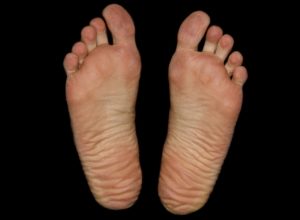Pregnant with Foot Pain? Here’s what you need to know.
Pregnancy can have many effects on your feet, some which can be long lasting. Take some simple precautions today to help stop the foot pain now and lower your changes of foot problems in the future.
Pregnancy Causes Gestational Diabetes
Gestational diabetes is a rise in your blood sugar that occurs while you are pregnant. The problem frequently goes away after the baby is born.
Gestational diabetes is still diabetes. This doesn’t mean that you had diabetes before conception or will have diabetes after delivery. Gestational Diabetes does, however, increase your risk of developing Type II Diabetes in the future. Gestational diabetes is usually diagnosed around the 24th week of pregnancy. The primary treatment goal is regulation of blood sugar to keep both baby and mother safe. This can usually be achieved with diet and exercise, however, in some cases insulin therapy is necessary. Untreated diabetes can have lasting effects on your feet, including numbness of your feet, poor wound healing, along with nail and skin changes.
Your feet change when you are pregnant
During pregnancy the size and shape of your feet can change. This can be attributed to both weight gain and an increase in elasticity of tendons and ligament fibers.
During pregnancy, it is common for women to develop a flat feet. This will cause the feet to increase in both length and width. It is not surprising for a woman to increase an entire shoe size during pregnancy!
A flat foot can be treated with modalities such as orthotics for arch support and physical therapy to strengthen your tendons.
In the future, if your new foot type goes untreated, it can lead to other changes such as bunions and hammertoes.
Your feet can look different during pregnancy
One of the things you may notice during pregnancy is that you see the veins popping out in your feet and legs, otherwise known as varicose veins. Pressure on the blood vessels in your abdomen can restrict blood flow that can back up in your feet and legs. Sometimes varicose veins are just unsightly, but sometimes they are painful. It may help to elevate your feet or wear support hose to help the blood return to your heart.
Pregnancy can cause changes in how you walk
While pregnant, weight gain can contribute to changes in the way you walk. This can cause foot, knee, hip and back problems. It is necessary during pregnancy to wear thicker and more supportive shoes. It may also be necessary to wear orthotics both during and after pregnancy to help prevent your arch from collapsing and give you better support. Having more supportive shoes and orthotics will also help limit changes in gait, increase stability, and decrease your risk of falls, which can be harmful to both you and your baby.
If you are concerned about your foot both during or after pregnancy, call Hollowbrook Foot Specialists at (845) 298-9074 for your preferred appointment, serving the Hudson Valley from Wappingers Falls!
By: Samantha DelRegno D.P.M.



